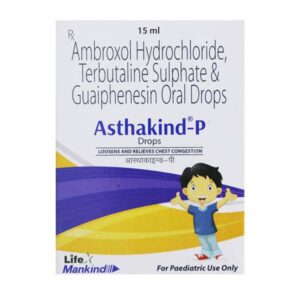AMBROXOL HCL + CPM + GUAIP +
Ambroxol Hcl: Ambroxol HCl is a medication primarily used to treat respiratory disorders associated with excessive mucus production. It belongs to a class of drugs called mucolytics, which work by breaking down and loosening thick mucus in the airways, making it easier to cough up and clear out.
The main use of Ambroxol HCl is to alleviate symptoms of various respiratory conditions, such as bronchitis, chronic obstructive pulmonary disease (COPD), asthma, and cystic fibrosis. It can also be beneficial in postoperative respiratory complications and as an adjunct therapy in respiratory infections.
The mechanism of action of Ambroxol HCl involves increasing the production of surfactant in the lungs, which is a substance that reduces the surface tension of fluid in the air sacs, allowing easier breathing. Additionally, it stimulates the movement of cilia in the respiratory tract, which helps in moving mucus out of the airways.
The usual dose of Ambroxol HCl for adults is 30 mg three times a day, while for children it is adjusted according to their body weight. It is available in various forms, including tablets, capsules, syrups, and inhalation solutions. The specific dosage and duration of treatment may vary depending on the individual’s condition, so it’s always important to follow the instructions provided by a healthcare professional.
Common side effects of Ambroxol HCl may include gastrointestinal disturbances such as nausea, vomiting, diarrhea, and abdominal pain. These side effects are usually mild and transient. In rare cases, allergic reactions, skin rashes, headache, dizziness, and bronchospasms may occur. If any severe or persistent side effects are experienced, it is advised to consult a healthcare professional.
It is always essential to consult with a healthcare provider before starting any medication to ensure appropriate use and to consider any potential drug interactions or contraindications based on an individual’s specific medical history and other medications they may be taking.
Cpm: Cpm, also known as Chlorpheniramine, is an antihistamine medication used to relieve symptoms of allergies such as sneezing, itching, watery eyes, and runny nose. It is also used to manage symptoms of the common cold, hay fever, and allergic reactions to insect bites or stings.
Chlorpheniramine works by blocking the action of histamine, a substance in the body that causes allergy symptoms. By inhibiting histamine release in the body, Cpm helps alleviate the symptoms associated with allergies.
The recommended dose of Cpm for adults is usually 4 mg every 4 to 6 hours, with a maximum daily dose of 24 mg. For children, the dosage depends on their age and weight, usually ranging from 1 mg to 4 mg every 4 to 6 hours.
Common side effects of Cpm include drowsiness, dry mouth, dizziness, blurred vision, constipation, and urinary retention. These side effects are more likely to occur with higher doses. It is important to avoid activities that require alertness, such as driving or operating machinery, while taking Cpm.
Some individuals may experience more serious side effects such as fast or irregular heartbeat, hallucinations, seizures, difficulty urinating, or allergic reactions. If any of these side effects occur, medical attention should be sought immediately.
It is important to note that Cpm may interact with other medications, such as sedatives, tranquilizers, and certain antidepressants. It is recommended to inform your healthcare provider about all medications you are currently taking to avoid potential drug interactions.
Overall, Cpm is an antihistamine medication commonly used to treat allergy symptoms, and it is important to follow the recommended dosage and consult with a healthcare professional before starting any new medication.
Guaip +: Guaip + is a common over-the-counter cough suppressant medication. It contains the active ingredient Guaifenesin, which is a mucolytic agent that helps to thin and loosen respiratory tract secretions.
Guaip + is used to relieve coughing due to minor throat and bronchial irritation associated with the common cold, allergies, or other respiratory illnesses. It works by increasing the hydration of mucus, making it easier to cough up and expel from the respiratory tract.
The usual recommended dose of Guaip + for adults and children 12 years and older is 200 to 400 mg orally every four hours, not to exceed 2.4 grams in 24 hours. For children 6 to under 12 years, the dose is 100 to 200 mg orally every four hours, not to exceed 1.2 grams in 24 hours. Children under 6 years should only take Guaip + under the guidance of a healthcare professional.
Like any medication, Guaip + may cause some side effects. Common side effects include dizziness, headache, nausea, vomiting, stomach upset, and rash. These side effects are usually mild and temporary. However, if any severe side effects or allergic reactions like difficulty in breathing, chest tightness, or swelling of the face, lips, tongue, or throat occur, immediate medical attention should be sought.
It’s important to note that Guaip + should not be used for persistent or chronic coughs associated with smoking, asthma, chronic bronchitis, or emphysema unless directed by a healthcare professional. Always read and follow the instructions on the packaging and consult a healthcare professional if you have any questions or concerns.

